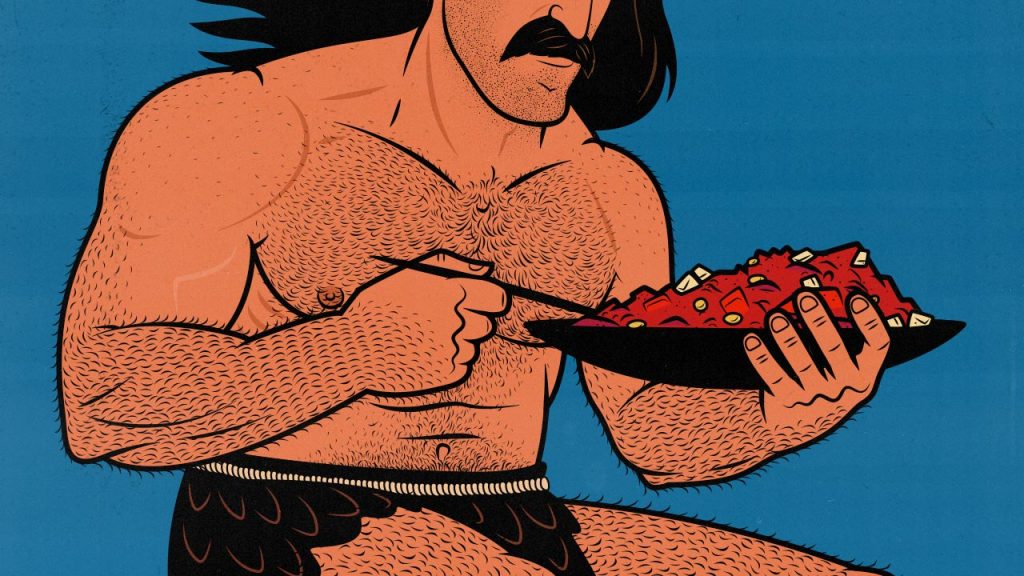
The Best Macros for Bulking: How Much Protein, Carbs & Fat to Eat
When figuring out our ideal bulking macros—how much protein, carbs, and fat we should eat—there are a few things we need to consider. First, we can look at the research to see which macros allow us to build muscle the fastest. Second, we can see which macros help us avoid gaining fat while bulking. Third, we can look at which macros make it easier to get into a sustainable calorie surplus.
But a lot of us care about more than merely building muscle. We also want to improve our general health as we do it. So we can also look at which macros have the best impact on our health as we bulk up.
So, what are the best macros for bulking?
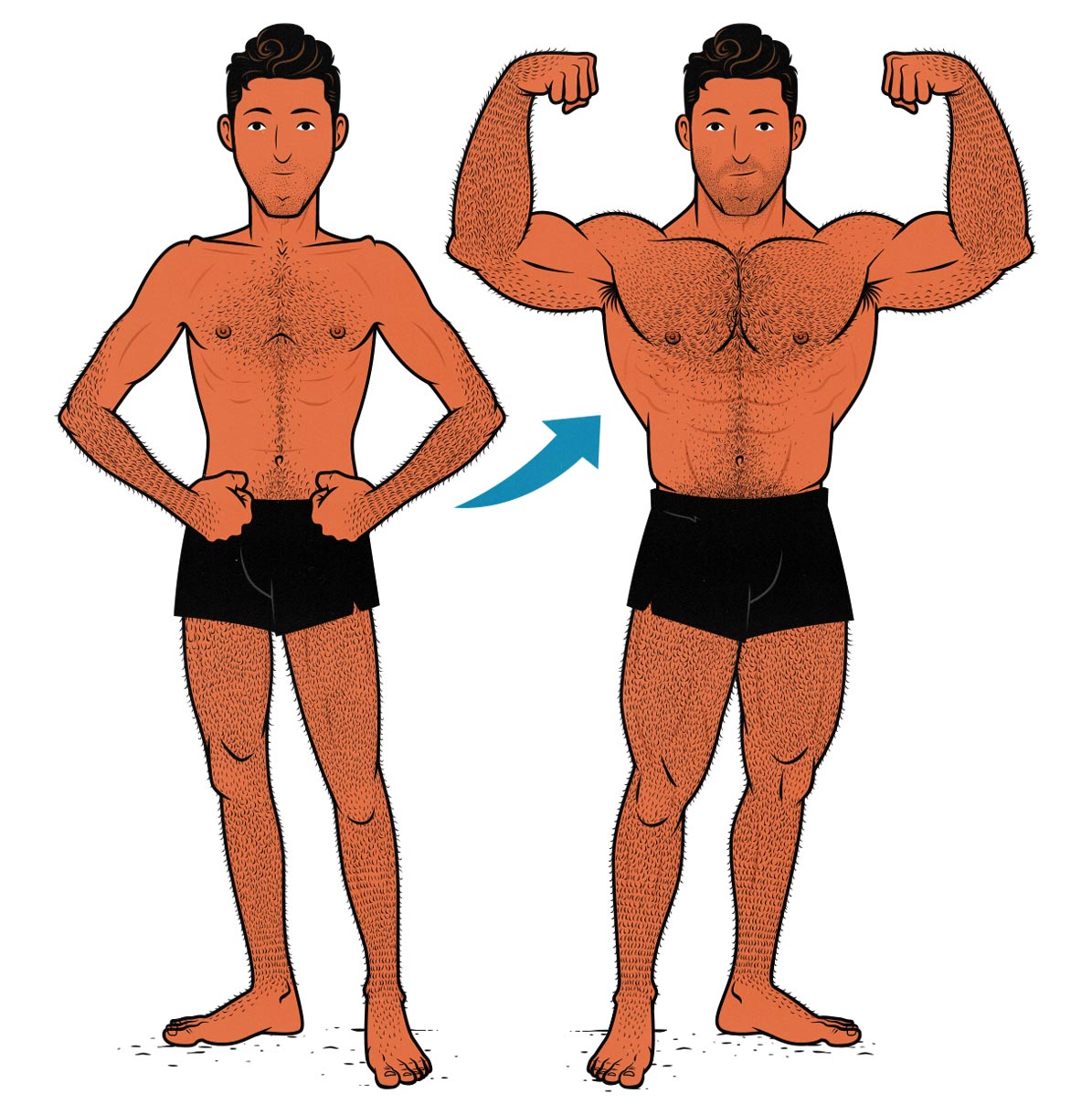
What are Macros?
There are a few different definitions of macros, but when we’re talking about eating food, burning fat, or building muscle, then we’re talking about macronutrients. Macronutrients are the types of food that we get our energy from, including protein, carbs, fat, and alcohol.
- Proteins: these are foods that get broken down into amino acids. Think of foods like chicken breast, white fish, egg whites, protein powder, greek yogurt, and cottage cheese. Protein is used mainly for building muscle, tissues, hormones, and enzymes. It contains 4 calories per gram.
- Carbs: these are foods that get broken down into glucose—sugar. Think of foods rich in starch, fibre, or sugar. Foods like fruit, vegetables, bread, rice, pasta, potatoes, and beans. Carbs are the most efficient source of energy. They contain 4 calories per gram.
- Fats: these are the foods that get broken down into fatty acids. Think of fatty cuts of meat, egg yolks, avocados, nuts, butter, and oils. Fats are used for hormone production, nutrient absorption, and stored as body fat for future use. They contain 9 calories per gram.
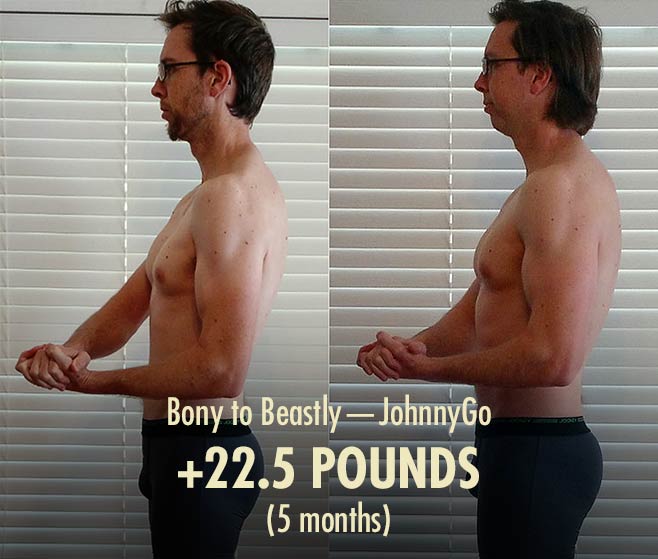
The two main reasons people care about macros for bulking are that 1) the amount of energy we consume determines whether we gain weight or not, and 2) the ratio of protein, carbs, and fat that we eat can have an impact on how quickly and leanly we build muscle.
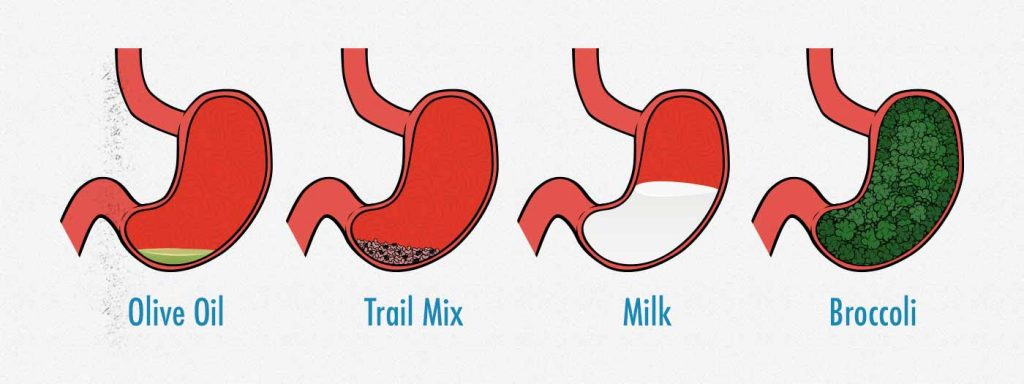
But another important factor is that the macros we eat can have a big impact on our appetite. Even when looking at unprocessed whole foods, we see that oils (containing 9 calories of fat per gram) are much easier to fit into our stomachs than vegetables, where fewer calories are mixed in with more fibre. As a result, when we’re trying to gain weight, it’s easy to lean into foods higher in fats and simple carbs, such as donuts and chips. But is that the best way to bulk? Yes and no. It’s only half right.
But before we get into carbs and fats, we should talk about the two principles that are absolutely crucial for building muscle:
- We need to eat enough calories to gain weight. Whatever macronutrient that energy comes from, if we aren’t in a calorie surplus, we won’t gain weight, and our ability to build muscle is severely limited. Plus, if we aren’t gaining weight, we aren’t bulking, so the rest of the article is moot.
- We need to eat enough protein to build muscle. Muscle is built out of protein. If we aren’t eating enough protein, we won’t be able to build much, if any, muscle.
Let’s go over calories and protein first, and then we’ll talk about balancing our intake of carbs and fat.
The Importance of Eating Enough Calories
To gain weight, we need to eat more calories than we burn. There are many different ways to estimate exactly how many calories we should eat to gain weight, with most of them working out to around 18–22 times your bodyweight in pounds per day. So for a guy who weighs 150 pounds, that’s 2700–3300 calories per day. That’s a wide range, and that’s okay.
When bulking, the important thing is to add around 500 extra calories to our diets, weigh ourselves every week, and adjust accordingly. That means that we don’t ever need to actually count our calories, we just need to add or remove food from our diets depending on how fast we’re gaining weight.
Are you gaining 0.5–1 pound of weight on the scale each week?
- If yes, keep doing what you’re doing. That’s perfect.
- If you’re gaining less weight than that, try adding another 200–300 daily calories into your diet.
- If you’re gaining more weight than that, that’s not necessarily a problem, especially during your first 1–3 weeks of bulking. But if you’re worried about gaining fat, try removing 200–300 daily calories from your diet to slow it down.
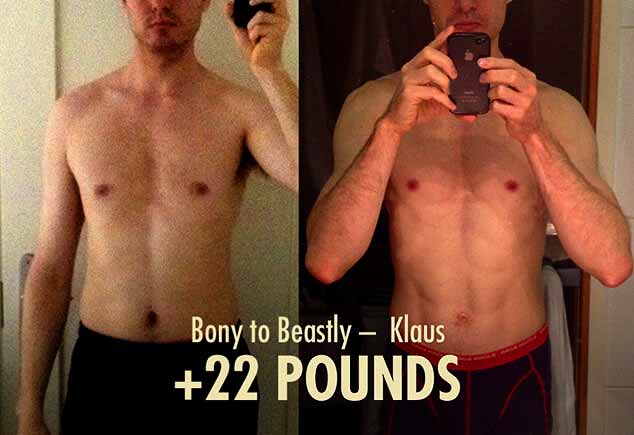
If you want to bulk more leanly, start by adding fewer calories into your diet and try to maintain a slower rate of weight gain—around 0.5 pounds per week is great. If you want to build muscle faster, feel free to start by adding more calories into your diet. Aiming to gain a pound per week is perfect for that.
The Importance of Eating Enough Protein
Before we talk about whether ectomorphs should eat more carbs, let’s quickly cover protein. Our muscles are constructed out of protein, so if we aren’t eating enough protein then we can’t build muscle. As a result, it’s more important to eat enough protein than it is to eat enough carbohydrates.
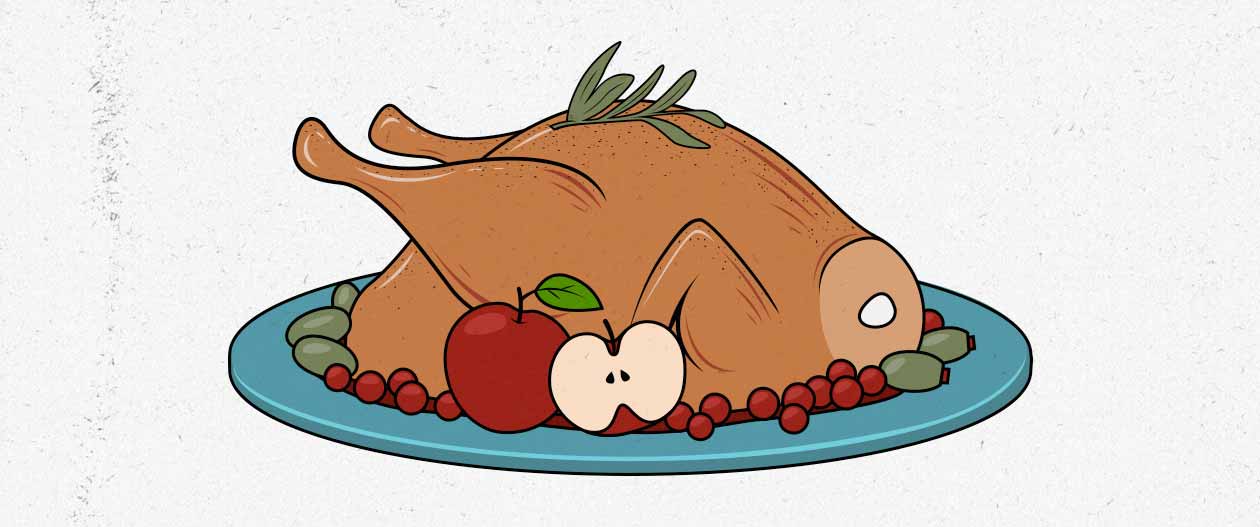
How much protein do we need? Most research shows that muscle growth is maximized at 0.8 grams of protein per pound bodyweight per day while bulking, with some research pointing to a slightly higher intake of 1 gram/pound/day (study). There’s no harm in eating a bit too much protein, and so we usually recommend aiming for a full gram/pound/day (study, study, study). That builds in a bit of leeway. If the nutrition labels exaggerate the protein contents of our foods or if we miscalculate our protein intake, we’re still eating enough to build muscle at full speed. For a 150-pound man, that means eating 150 grams of protein per day, which often works out to around 20–30% of our overall calorie intake.
The protein recommendations for building muscle are around twice as high as the recommended protein intake for a sedentary person, and so not eating enough protein is a common problem for some beginners. They eat too little protein, and so they struggle to build muscle. If they’re gaining weight without being able to gain muscle, that results in a disproportionate amount of fat gain. That can be a real problem, especially for skinny-fat guys.
However, although it’s true that protein is essential for building muscle, it’s not a case where more is better. Once we’re hitting that minimum requirement for building muscle, eating more protein on top of that has little benefit beyond the extra calories that we get from it. For example, in this study, the researchers fed the participants 550% of the recommended amount of protein, but they didn’t gain any extra muscle.
As we mentioned above, it’s not unhealthy to eat extra protein. If you prefer it, that’s perfectly fine. But most people find that high-protein diets make it harder to eat enough calories to gain weight. In the words of Mike Israetel, PhD:
[Protein] has such a profound effect on suppressing hunger that gaining weight by adding tons of extra protein turns into an incredibly uphill battle to get in enough calories. A battle that most people lose.
Mike Israetel, PhD in Sports Physiology
Not only is protein incredibly filling, we produce extra body heat as we digest it, causing our metabolisms to rise. This phenomenon is called the Thermic Effect of Food(TEF) or Diet Induced Thermogenesis (DIT). Here’s an example of that:
- If we eat 1000 calories of fat, our bodies burn off 15 calories as heat.
- If we eat 1000 calories of carbs, our bodies burn off 75 calories as heat.
- If we eat 1000 calories of protein, our bodies burn off 250 calories as heat.
If we’re trying to gain weight, then, it may be easier to get our extra calories from carbs and/or fat, and there may even be some extra advantages to doing so.
So to summarize, it’s crucial that we eat enough protein while bulking (around 0.8–1g/lb/day). Otherwise, we won’t be able to build muscle at full speed. However, eating even more protein than that doesn’t seem to yield any extra muscle growth, but can make it harder to eat enough calories to gain weight.
Carb vs Fat Macros
The most important parts of a bulking diet are eating enough calories to gain weight and enough protein to build muscle. But once our protein requirements are met, we can get our extra calories by eating more carbs or more fat. But which should we favour? More carbs? More fat? An even split of both?
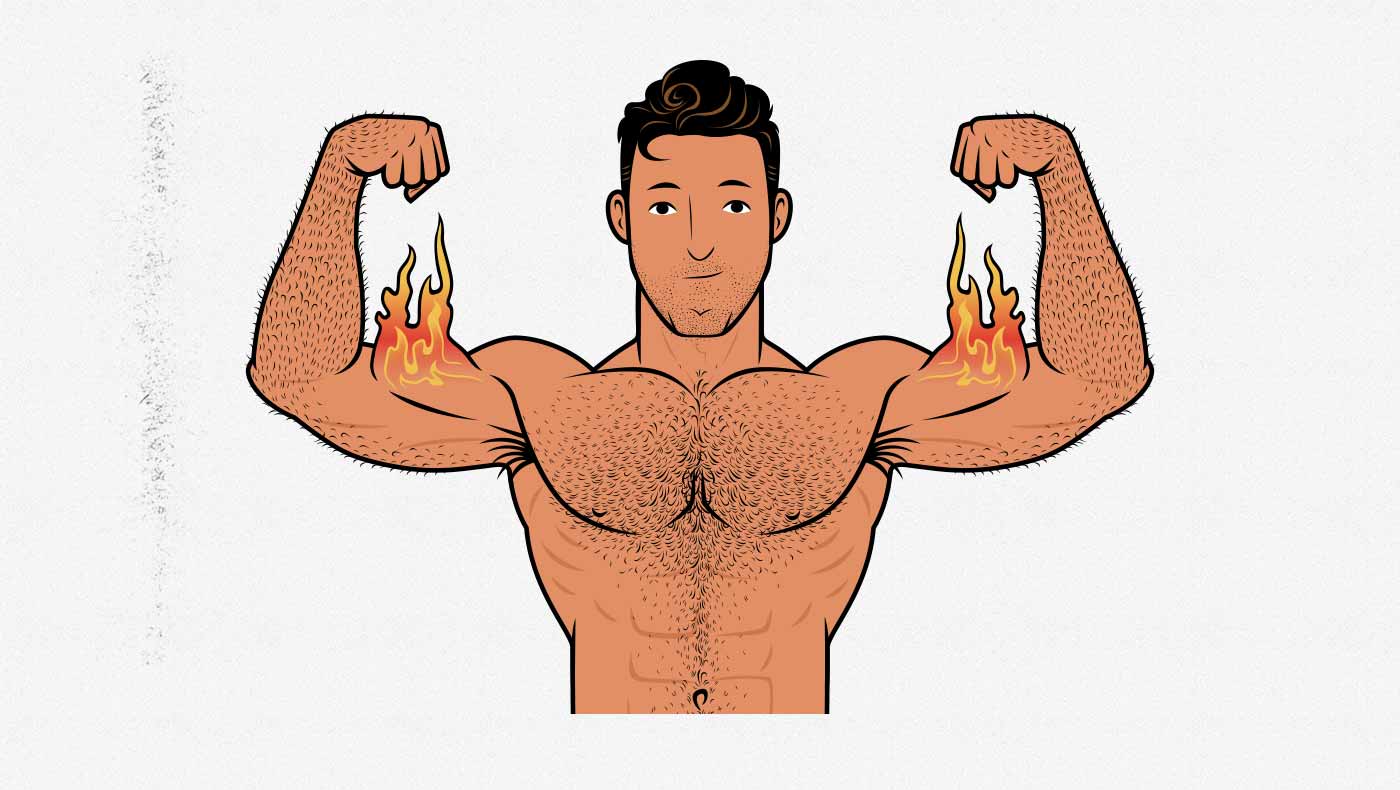
There are three main fields of research that are concerned with muscle growth: bodybuilding research, strength research, and sports research. In all cases, they recommend that we get more of our calories from carbohydrates than from fat.
- Bodybuilding: in hypertrophy training and bodybuilding research, there’s a strong recommendation to get 40–60% of our calories from carbohydrates to increase our rate of muscle growth (study, study).
- Strength training: The National Strength & Conditioning Association makes similar recommendations, noting that getting 45–65% of our calories from carbohydrates tends to be best for building muscle, gaining strength, and improving our general health.
- Sports performance: The Journal of the International Society of Sports Nutrition says that the best way to improve our strength and athletic performance is to get most of our extra calories from carbs, which often works out to around 40–60% of our overall macros.
In some cases, the researchers note that overweight people who are trying to lose weight often prefer low-carb diets. Not that low-carb diets are better for losing weight, just that they’re a viable option, and that some people enjoy them. But for bulking, the research is unanimous: we should get more of our macros from carbs.
Carbs vs Fat for Building Muscle
The next question, then, is why? Low-carb and keto diets are trendy among people trying to lose weight, and they can indeed be effective. But why do higher-carb diets work better for bulking?
Carbs have a few muscle-building benefits:
- Improved workout performance: when we eat a diet that’s higher in carbohydrates, our muscles store extra glycogen, giving our muscles more energy, and improving our workout performance, and allowing us to stimulate more muscle growth (study).
- Greater protein efficiency: eating more carbs reduces protein breakdown, allowing us to use more of the protein we’re eating to build muscle.
- More insulin: eating more carbs causes us to produce more insulin, which helps us shuttle the calories we’re eating toward muscle growth (study).
- Improved hormones: Carbs increase testosterone and reduce cortisol when compared to fats.
- Lower incidence of getting sick: carbs strengthen our immune systems and reduce our chances of getting sick while lifting weights (study)
- Faster muscle growth: there’s also some research showing that the more glycogen we have in our muscles, the faster our muscles will grow.
- Fuller, harder muscles: glycogen is stored inside our muscles. It’s a type of lean mass. So when our muscles are packed full of glycogen, they’re bigger and fuller.
Carbs vs Fat for Avoiding Fat Gain
Bulking is the exact opposite of losing weight. That means that diets that are good for helping overweight people burn fat aren’t always ideal for building muscle. Taking popular fat-loss diets like keto and then applying those same principles to building muscle doesn’t always work very well.
To lose weight, we need to eat fewer calories than we burn, getting those missing calories from our body fat. In that situation, if our body is running on fat for energy, that’s great. We get our energy from dietary fat and body fat. No problem.
But for those of us trying to bulk up, we’re eating more calories than we’re burning, and we’re storing those extra calories. If we’re using fat as our main energy source, then we’re burning fat and storing fat. That’s not what we want. Better to use carbs for energy and store it in our muscles.
For example, in this 2-week study, they compared lean and overweight participants, seeing whether they responded better to bulking on a high-carb or high-fat diet. The overweight participants gained roughly 33% muscle and 67% fat, which was to be expected—they weren’t exercising.
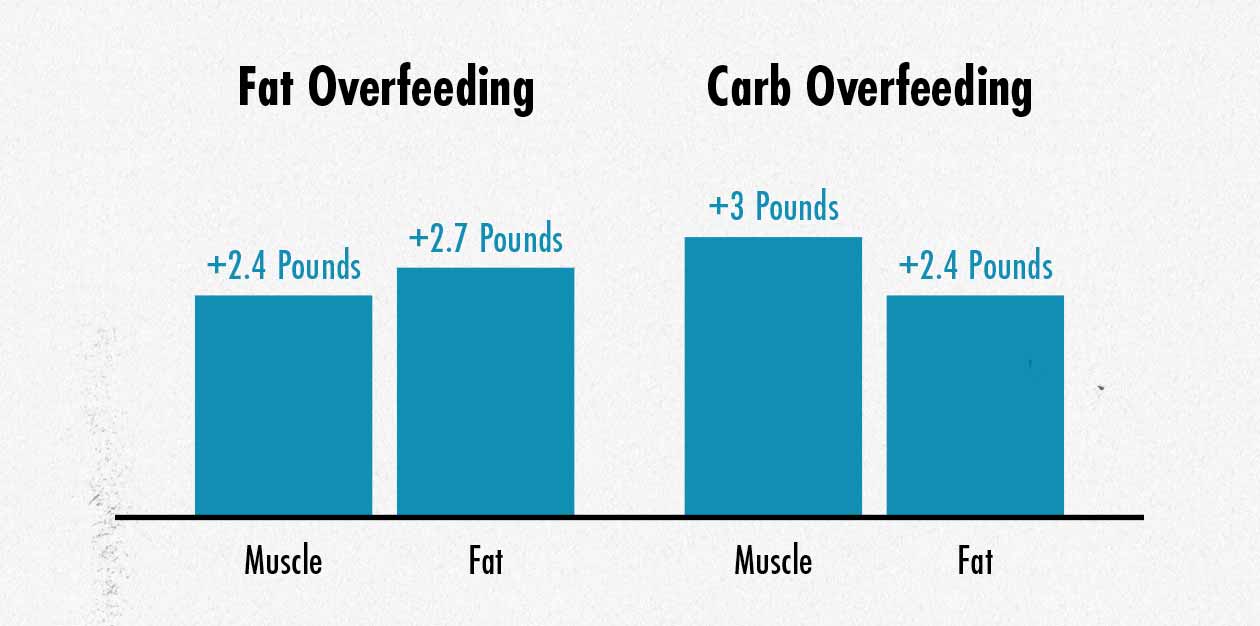
But the results of the lean participants were different. Half of them were overfed with carbohydrates, resulting in more muscle growth and less fat gain (56% muscle, 47% fat). The other half overfed with fat, resulting in less muscle growth and more fat gain (47% muscle, 53% fat).
Now, it’s important to note that none of the participants were working out or eating enough protein, and so the ratio of muscle-to-fat gain was horrible in both groups. But if we add in hypertrophy training, we’d expect the carb group to build even more muscle, given that carbs improve workout performance and muscle growth. This would leave fewer extra calories to spill over into fat gain, producing even leaner gains.
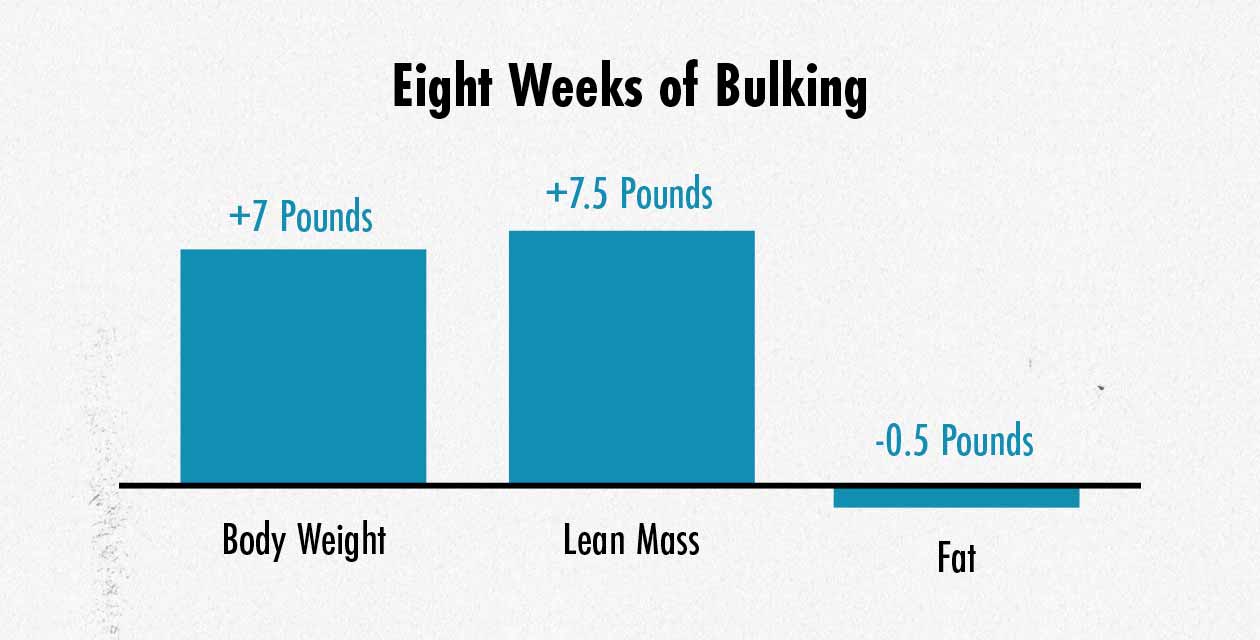
For instance, this study found that adding 1,800 calories of carbohydrates into the diets of men who were following a rigorous bodybuilding program caused rapid muscle growth with simultaneous fat loss.
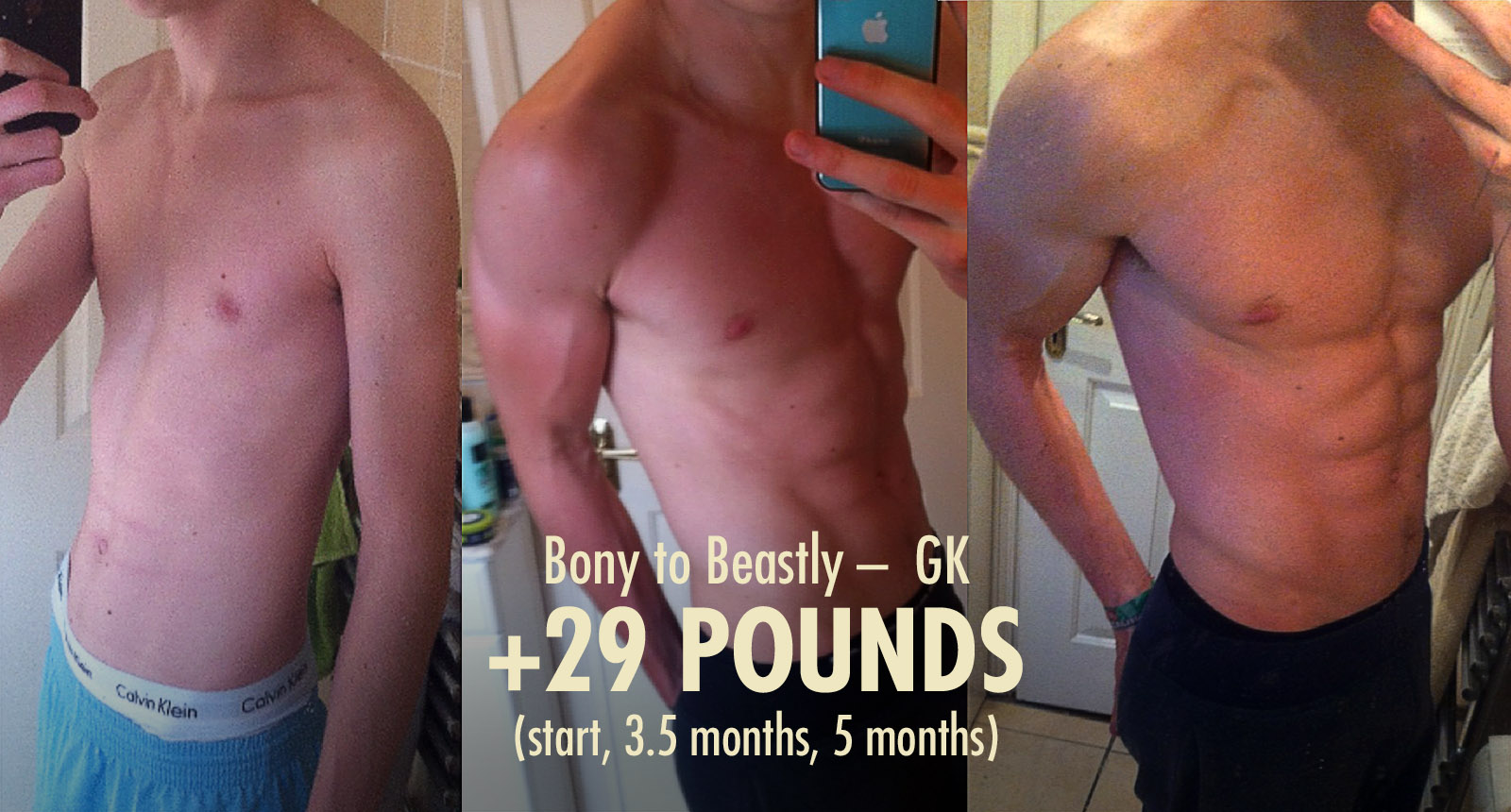
We see similar results in some members of our Bony to Beastly Bulking Program. Results vary, of course, but by eating enough protein, following a good hypertrophy training routine, getting enough sleep, and eating plenty of carbohydrates, we’re often able to build muscle quite quickly and leanly.
Do Skinny Guys Need More Carbs?
What about so-called “ectomorphs” and “hardgainers“? Should we use traditional bulking macros, or should we adjust them because of our naturally skinny body types?
We don’t need more carbs, but as we showed in the previous section, thinner people do tend to gain more muscle and less fat when bulking on higher-carb diets (study). And there are a few other reasons why carbs tend to be especially helpful for us:
- Carbs aren’t as filling as protein, making it easier to eat more calories (study). This is a problem we often see in low-carb bulking studies. The low-carb group often fails to gain muscle because their appetite is suppressed, preventing them from getting into a calorie surplus.
- Thinner people tend to have a higher carbohydrate tolerance (study). What this means is that because we aren’t overweight, we’re able to clear glucose out of our blood without any issues.
- Lifting weights improves our ability to handle high-carbohydrate diets (study). When we’re working out, we’re burning through the glycogen in our muscles. Then, when we eat carbs, we funnel those carbs back into our muscles.
- Building muscle further improves our carb tolerance (study). The bigger our muscles are, the more weight we can lift, and the more fuel we burn through in our workouts. Plus, bigger muscles can store more glycogen. That means that the more muscle we add to our frames, the more carbs we can benefit from.
Overall, yes, skinny guys benefit from bulking on higher-carb diets. But even if we look at obese people who are training for muscle growth, they build more muscle and burn more fat when they favour carbohydrates (study).
get our bulking recipes—smoothies, snack, & protein balls
4 free bulking recipes

Get four bulking recipes in a downloadable PDF file. Get the full explanation, ingredient list, macros, and steps to follow.
Plus, we’ll make sure you’re on the b2B newsletter, and send you all of our best muscle-building content.
The Ideal Macros for Bulking
How Much Protein Should We Eat?
As we covered in the first section, our rate of muscle growth is maximized. with 0.8 grams of protein per pound bodyweight per day, with some research showing a benefit to going as high as a gram/pound/day.
Putting that into practice, a guy weighing 150 pounds should be eating 120–150 grams of protein per day. If we think about percentages, that usually winds up being around 20–30% of our total calorie intake. Eating more than that is perfectly fine, but it won’t speed up muscle growth.
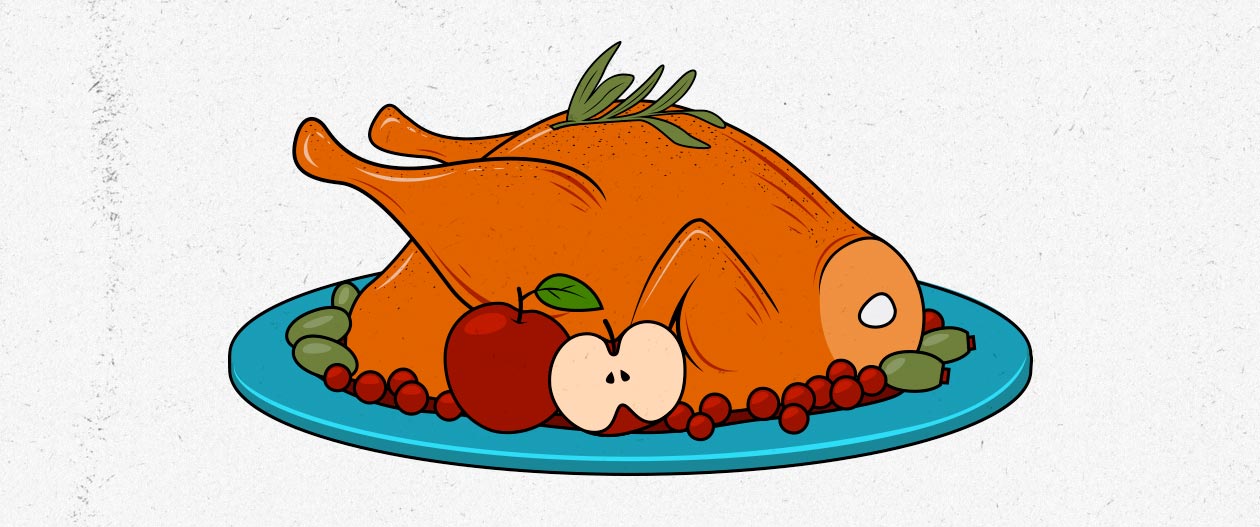
The other thing to consider is protein distribution. Every time we eat enough protein (20+ grams), we get a small burst of muscle growth. So by spreading our protein intake out throughout the day, we can build muscle slightly faster. This effect seems to be maximized with around 4–5 meals per day. So for someone eating 150 grams of protein per day, that might mean 3 meals and 2 snacks each containing 30 grams of protein.
How Many Carbs Should We Eat?
As a general rule of thumb, we should get around 50% of our calories from carbs while bulking. Or, if you prefer counting grams, getting a minimum of around 3 grams of carbohydrates per pound bodyweight per day tends to be ideal. That will leave enough room for protein and fat, and the higher proportion of carbs will help you gain muscle faster and more leanly.

Then, the leaner and more active you are, the higher your metabolism and carb tolerance will be. If you’re bulking on 20x your bodyweight in calories per day or more (e.g. a 150-pound guy bulking on 3000 calories) it might help to get more of those extra calories from carbs, which might drive your carb intake up closer to 60%.
For example, a 150-pound ectomorph might bulk on:
- 20x his bodyweight in calories per day (3000 calories)
- 3 grams of carbs per pound bodyweight (450 grams)
- 60% of his calories from carbs (1600 calories).
How Much Fat Should We Eat While Bulking?
We’ve already covered how much protein and carbs to eat. So to figure out your overall bulking macros, fill in the rest of your calories with fat.
- Protein macros: 0.8–1 grams per pound bodyweight per day, which is around 20% of your calories.
- Carb macros: 3+ grams per pound bodyweight per day, which is around 50–60% of your calories.
- Fat macros: the remaining 20–30% of your calories.
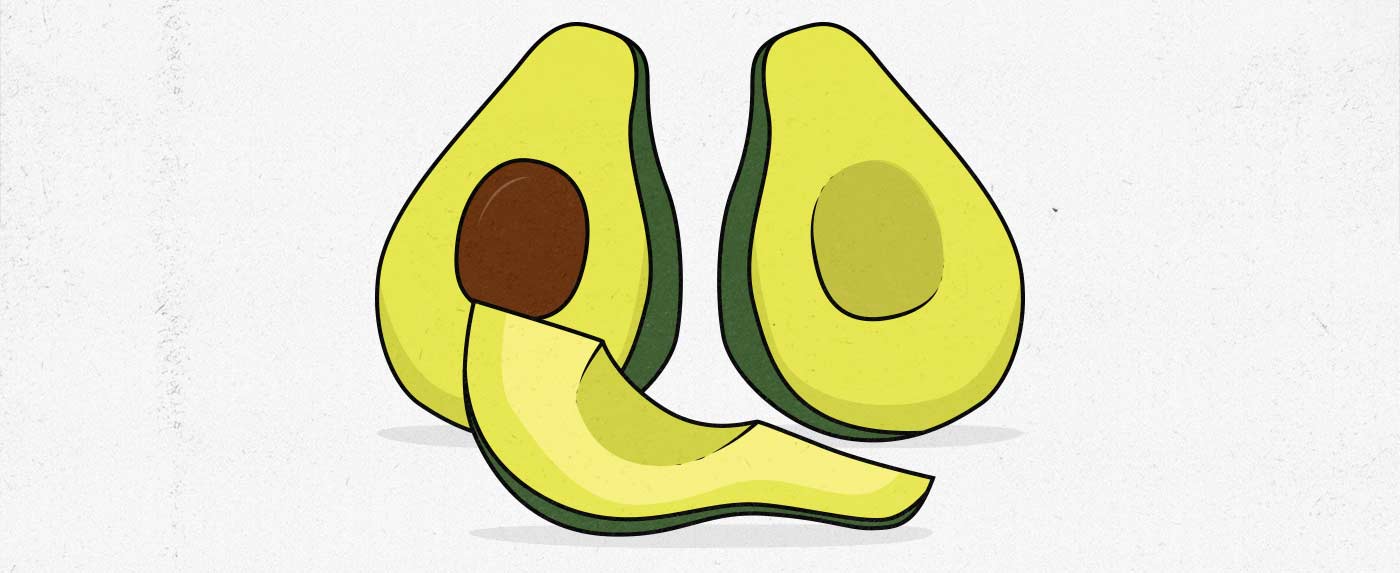
When it comes to choosing your sources of fat, there’s no need to intentionally avoid saturated fats, but it’s important not to intentionally drive your saturated fat intake too high. For example, sometimes skinny guys will start drinking tons of whole milk in order to bulk up (GOMAD, LOMAD). That’s a great way to increase our calorie intake, but whole milk is high in saturated fat, which can drive our saturated fat intake too high, resulting in extra fat gain.
It’s better to aim for a mix of different fats. It’s great to eat eggs, drink milk, and eat some meat, but we also want to make sure that we’re eating plenty of polyunsaturated sources of fat, such as nuts and olive oil, and getting some EPA and DHA from eating fatty fish (or supplementing with fish oil). That will give us a more balanced fat intake.
Summary
The most important macro for bulking is protein. Failing to eat enough of it can radically reduce our rate of muscle growth. Getting 0.8–1 grams of protein per pound bodyweight per day is ideal, which usually works out to around 20% of our macros coming from protein.
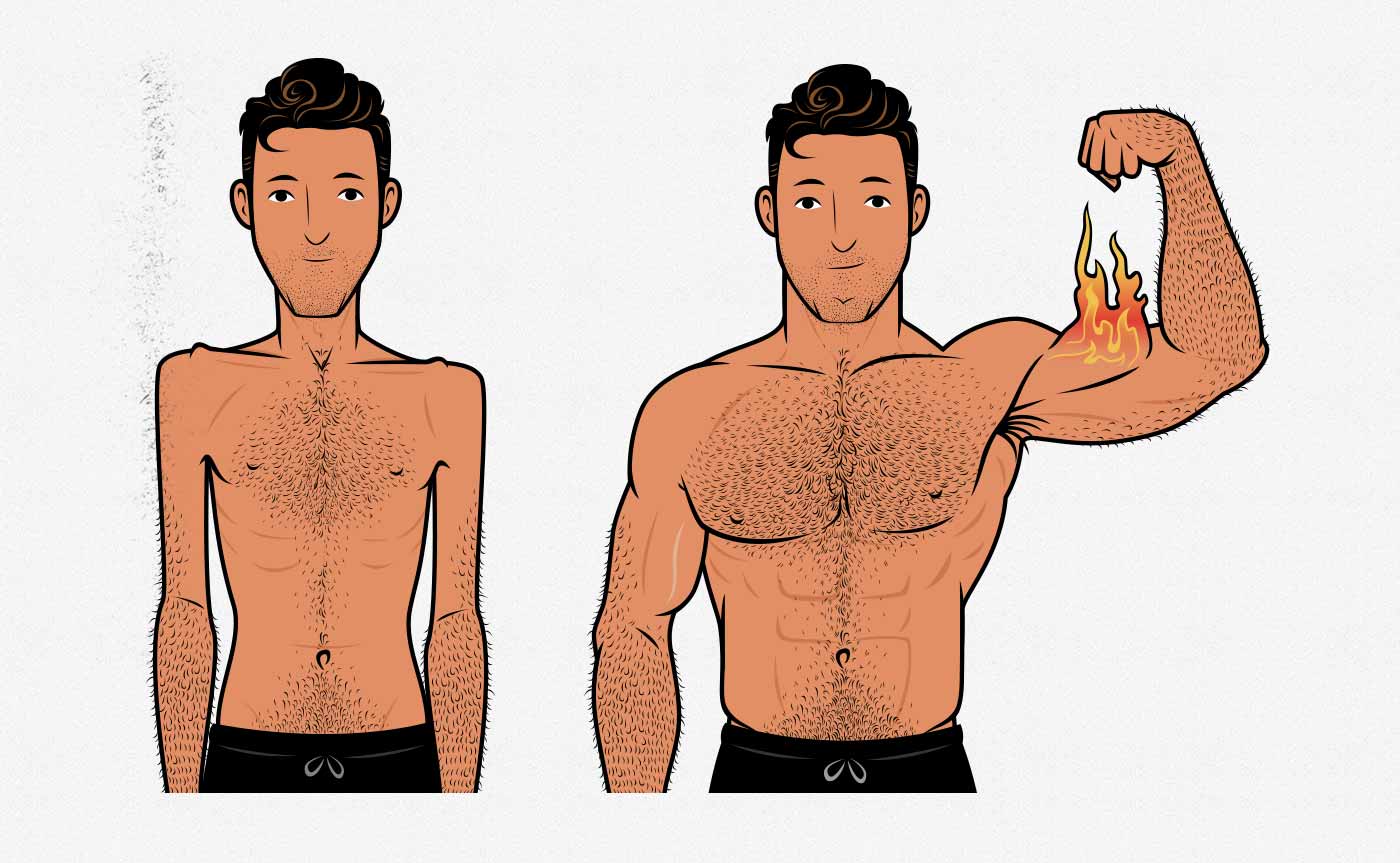
Once we’re eating enough protein, the more carbs we can eat, the better. We tend to bulk up faster and more leanly when we get 50–60% of our macros from carbohydrates, which usually works out to around 3 grams of carbohydrates per pound bodyweight per day. We don’t need to be precise with our carb intake, though, and there’s plenty of room for personal preference.
After we’re eating enough protein and carbs, we can get the final 20–30% of our macros from fat, ideally with only around a third of that coming from saturated fat (7–10% of total calories).
And there we have it. The ideal bulking macros are to get around 20–30% of our calories from protein, 50–60% from carbs, and 20–30% from fat.

